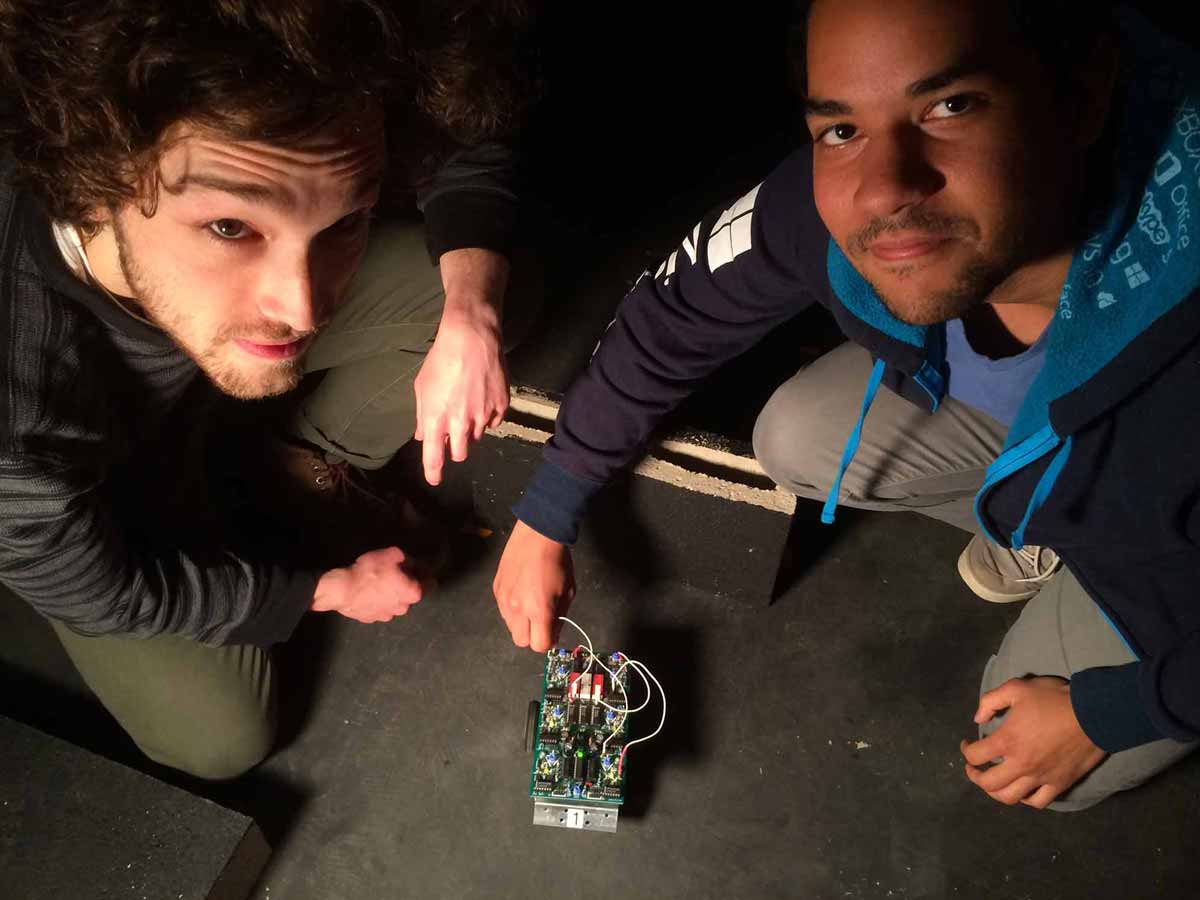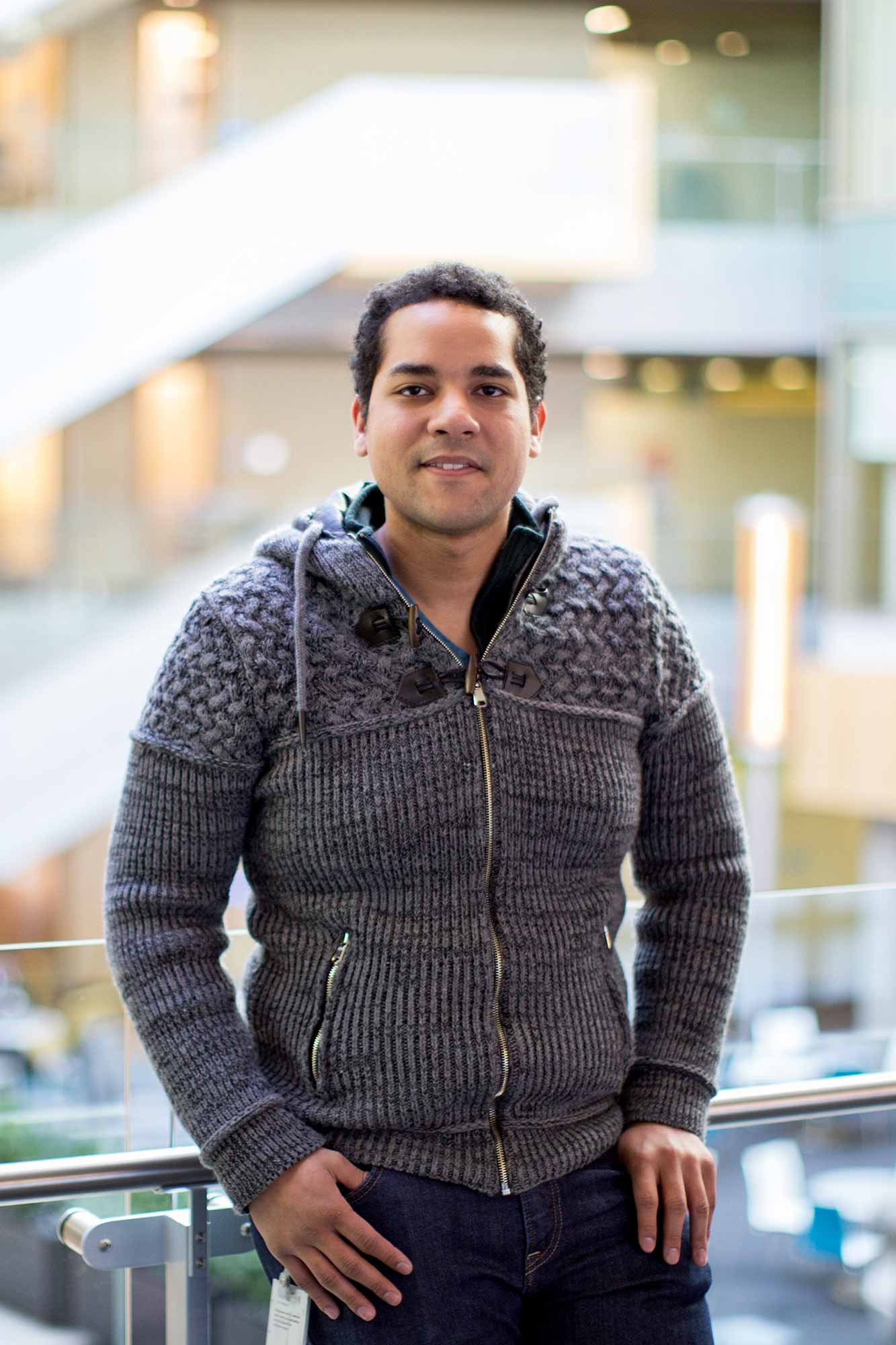One Year OutAaron Hill ’16 and Jake Brawer ’16Nature and Nurture…for Robots
One Year OutAaron Hill ’16 and Jake Brawer ’16Nature and Nurture…for Robots
Research partners at Vassar, Aaron Hill ’16 and Jake Brawer ’16 are now on opposite coasts. Hill, who graduated as a computer science major, is at Microsoft in Redmond, WA, and Brawer, who majored in cognitive science, is at Yale, getting a PhD in computer science and working in Yale’s renowned Social Robotics Lab under Professor Brian Scassellati.

Hill and Brawer recently had a nice surprise—news that a paper they coauthored based on their research at Vassar has been published in Frontiers in Robotics and AI, a top-ranking open-access journal. Their two-year project under Vassar professors Eric Aaron, John Long, and Ken Livingston explored the impact of epigenetic operators on the evolution of physically embodied robots.
Evolving robots? “Evolution is not something that only biological beings do,” says Brawer. “It’s actually a facet of self-replicators, more specifically, imperfect self-replicators. What reproduction really is, is a very poor way of making a copy of yourself, and the poorness is actually an important factor because it creates variation, and evolution acts on variation.”

And you can apply that to robots? “You build a robot that performs a task, and you test it to see how fit it is,” says Brawer. “You test it against multiple slightly different versions, and whichever is the fittest, you slightly modify through mutation or reproduction—obviously, an abstract version of reproduction—and then you test that new version, and hopefully it is better at performing that task. And you keep doing that until you get something that looks pretty good.”
And what exactly are “epigenetic operators?” In biology, Brawer explains, epigenetic factors are the macro and micro environmental factors that control whether and how a particular gene is expressed.
The genomic environment itself is an epigenetic factor. If a human being has the gene for blue eyes, for example, how that gene is expressed depends on the genome it’s placed in. If it’s placed in a genome where it’s paired with the gene for brown eyes, it will be suppressed. “We wanted to include the notion of dominant and recessive genes in our research and see what happened if one gene had the ability to overwrite another,” says Hill.
Robotics researchers at Vassar and elsewhere have been manipulating the genetic code in physically embodied robots for decades, and they’ve also done computer simulations involving epigenetics. “Our innovation was doing it with actual robots,” says Brawer. “There’s a good reason it hadn’t been done before, and that’s because it’s incredibly time consuming. If you’re doing it as a simulation, you can just run it overnight and have thousands of generations done while you’re sleeping.”
Using Braitenbots—robots inspired by the work of neuroscientist Valentino Braitenberg—Hill and Brawer did ten generations with ten individuals in each generation for each experimental trial. “Braitenbots are basically circuit boards with wheels,” says Brawer. “All we manipulated was the wiring, so it wasn’t too time consuming, but when you’re doing hundreds, it takes a while.”

And the results? “In biological systems, epigenetic factors can result in positive, negative, or neutral changes,” says Hill. “In our experiment, each generation got worse at the task we were giving them, which was to navigate around some obstacles and find a source of light. So we were successful in demonstrating that epigenetic factors have an impact, even though in our case it was negative.”
What this means for scientists who study evolutionary robotics is that it may be important to include epigenetic operators in future investigations of evolvability.
Hill and Brawer’s research grew out of Vassar’s annual robotics challenge where teams of students build autonomous robots that compete against each other in completing a specified task. “The year we took the challenge, the professors incorporated the requirement that the robot would test some evolutionary principle,” says Brawer. “After the competition was over, John and Ken asked us if we wanted to continue doing research on evolvability, and we said yeah! We worked on it for over two years, so it was a very long road to get the paper published. But it was a blast, and I learned a ton, and I got to work with some incredible people.”
Hill is currently a content developer at Microsoft, a position that involves writing about technology and “deeply technical stuff,” but graduate school in either computer science or robotics is in his future. Brawer is in the computer science PhD program at Yale, but says “I still consider myself a cognitive scientist. The work I’m doing here, and the work I want to do, is cognitive science work.” He hopes to make a career in academia, “mostly because I want my research to be freely available to people, and that isn’t necessarily the case in the private sector.”
And what was the most important thing they learned at Vassar? Hill says it’s that “there is a great deal of value in combining different academic disciplines and perspectives. I definitely gained something from taking a drawing class and an international studies class, just to become a well-rounded person. And in our research project, that’s what Jake and I did. We took a biological concept and introduced it into the robotics discourse. I learned to keep an open mind and to explore different thought processes and different approaches.”
Brawer says the most important thing he learned was how to learn. “And specifically, how to teach myself things. That’s not to say that I didn’t learn from my professors. But I was lucky enough to be able to do a lot of research early on, and that entails diving into subjects and material that you don’t have much experience with, and that’s a really good experience. I learned that I love learning and challenging myself, and that is something I will always be thankful for.”